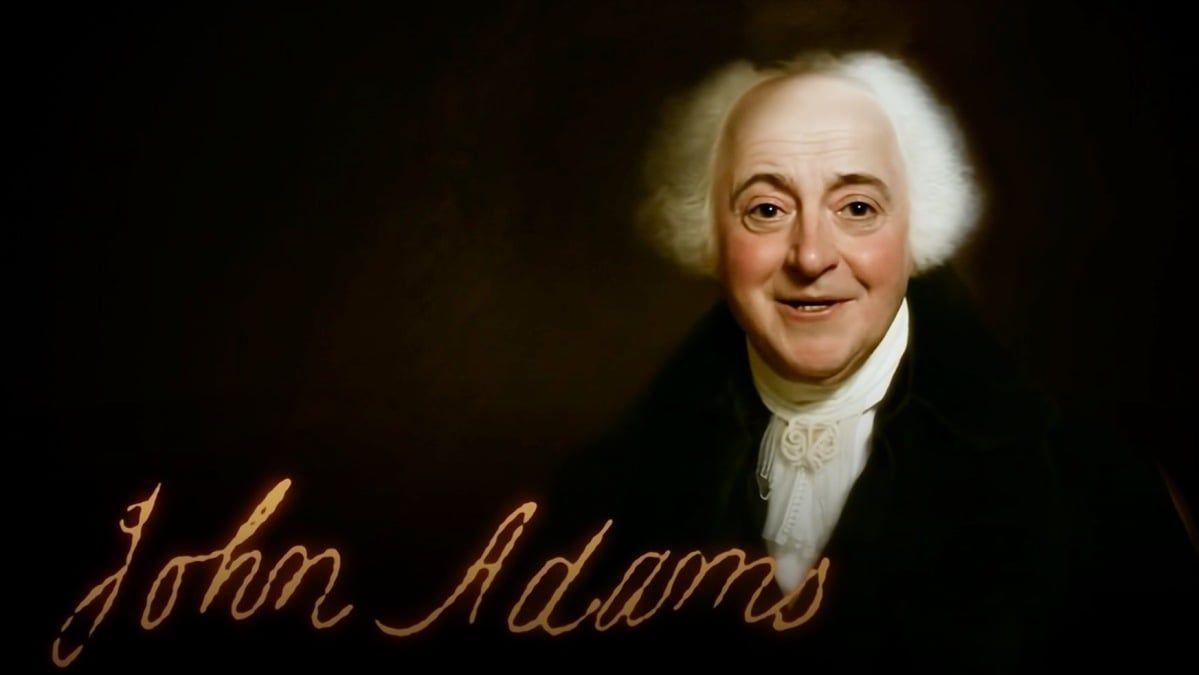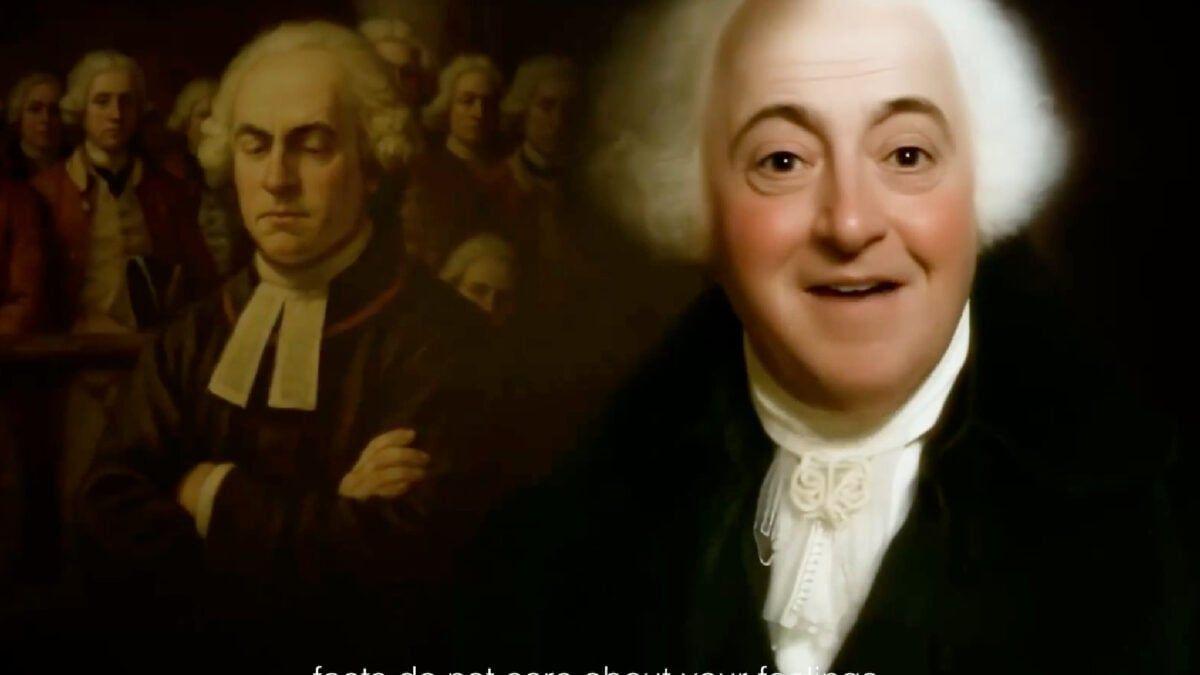White House's AI-Generated 'Founders Museum' Sparks Controversy Over Historical Accuracy
3 Sources
3 Sources
[1]
Trump's New History Exhibit Features Fake Quotes From AI-Generated Founding Fathers
John Adams never actually said "Facts do not care about your feelings." The White House recently commissioned a new history exhibit in Washington, D.C. created by the far-right "education" group PragerU. The exhibit features 82 paintings and 40 AI videos, presenting a rather distorted view of America's founding. The AI-generated videos even include fake quotes from the founding fathers, including one that seems like a joke. But the folks at PragerU are serious about their mission, even if the intention is to own the libs. What kind of quotes are we talking about? The video of an AI-generated John Adams, which is available online at Prager U's website, shows the second president saying, "facts do not care about our feelings." That's a phrase that became popularized in the 2010s by far-right influencers like Ben Shapiro and Charlie Kirk. Historically, White House exhibits haven't included such obvious attempts at trolling. It should be noted that the closed captioning reads "your feelings" rather than "our feelings," the latter being how it's spoken by the AI John Adams for whatever reason. But that's precisely the kind of attention to detail you'd expect from PragerU. The new exhibit is dubbed the Founders Museum and was created for the lead-up to the semiquincentennial celebration (250th anniversary) that will be happening in 2026. PragerU created the exhibit with the White House Task Force 250, which is overseeing the semiquincentennial activities, according to NPR. Secretary of Education Linda McMahon, who has said she's trying to put herself out of a job by shutting down the Department of Education, is featured on PragerU's website in a promotional video insisting that the new exhibit's "patriotic education does not mean propaganda." McMahon infamously referred to AI as "A1" (like the steak sauce) at a recent speaking engagement. The PragerU videos are also filled with the kind of AI-generated distortions and anomalies that we've come to expect. Some of the videos include figures with either too many or too few fingers. Generative AI tools still struggle with human hands, creating alien-like figures that seem to haunt the PragerU creations, as you can see below in a screenshot from the John Adams video. PragerU is notorious for creating inaccurate learning materials that sanitize history. One video that went viral in recent years shows Christopher Columbus scolding children for judging him about slavery. “Being taken as a slave is better than being killed, no? I don’t see the problem," the animated Columbus says. It's no surprise that PragerU would create ridiculous nonsense. The shocking part is that their version of history is being legitimized by the U.S. government. The new videos also inject plenty of mentions of God, which is certainly a choice. The founder of PragerU, Dennis Prager, often talks about spreading "Judeo-Christian values." Aside from the larger fabrications, like John Adams quoting Ben Shapiro, there are also countless smaller issues with the way the history is presented at the new exhibit. For example, Samuel Adams says that he was called a "troublemaker," a word that didn't exist until four decades after his death and wouldn't actually become popular until the 20th century. It's a small issue, of course, but it's the kind of thing that probably wouldn't have been permitted by museum curators who actually know any history. PragerU is an unaccredited "university" that doesn't hold classes or issue diplomas. But its materials are still finding their way into the hands of impressionable kids. PragerU's materials have been approved for use in public schools in at least ten states, according to the company's website, including Alaska, Arizona, Florida, Idaho, Louisiana, Montana, New Hampshire, Oklahoma, South Carolina, and Texas. That's up from five states in early 2024. Donald Trump has major issues with the way history is taught in the 21st century. The president has criticized leaders at the Smithsonian, calling the institution "out of control," during his regular rants. Trump even complained in one post on Truth Social that the Smithsonian was discussing "how bad Slavery was," among other things. To be clear, slavery is bad, no matter what folks like Trump and PragerU's animated Christopher Columbus might insist. And learning about slavery is necessary to understand American history. PragerU is becoming normalized as a reliable source of information, whether it's in America's classrooms or at the White House. And the nation is certainly going to be dumber and more fascist as a result. But it doesn't seem like there's much that can be done about any of that at the moment. Trump is picking off America's institutions one by one, destroying our understanding of U.S. history and bulldozing any opposition. All of that is happening while America's "opposition" leaders like Chuck Schumer and Hakeem Jeffries insist fighting back isn't the savvy thing to do. What would a guy like John Adams think about bowing to tyrants like Trump?
[2]
'Founders Museum' from White House and PragerU blurs history, AI-generated fiction
An AI-generated image of former President John Adams is part of an exhibit that is a partnership between the Trump administration and conservative nonprofit PragerU. The White House/PragerU hide caption A new history exhibit commissioned by the Trump administration has some historians perplexed, as the administration's pushback on arts and history raises questions about omitting marginalized voices in the nation's history. Eighty-two paintings -- including portraits of the 56 signers of the Declaration of Independence, as well as key events from America's founding -- make up The Founders Museum. The exhibit, just steps from the White House inside the Eisenhower Executive Office Building, marks a partnership between the administration's White House Task Force 250 and conservative nonprofit PragerU to celebrate the lead up to America's semiquincentennial next year. Besides paintings of Thomas Jefferson, Alexander Hamilton and Betsy Ross, the museum also features over 40 AI-generated short videos of these historical figures coming to life to share their stories -- all available online and produced by PragerU. In a statement to NPR, the White House said that the exhibit uses the power of AI so that "these people, places and events come to life, making history engaging to Americans across the country." "While the project to bring the Founders and the signers of the Declaration of Independence into focus is one that many historians admire and would support," William G. Thomas, vice president of the research division at the American Historical Association, says, "I think there's some concerns about how that's done in this case." This includes concerns about how words and stories of real-life historical figures could be reshaped by their AI counterparts. PragerU CEO Marissa Streit tells NPR that the videos were a joint effort between the White House team of experts, PragerU scholars, and widely referenced historical sources. The danger of projects like The Founders Museum, according to Brendan Gillis, director of teaching and learning for the American Historical Association, is that it focuses narrowly on a small set of experiences, making it seem like this is all the American Revolutionary history that we need to know. But, he says, "there's many, many more people who shaped the American Revolution and kept this story going." One concern is how AI-generated videos can sometimes blur the line between reality and fiction. In one video, an artificially generated John Adams says, "Facts do not care about your feelings" -- a phrase often used by conservative commentator and PragerU presenter Ben Shapiro. "I have real concerns about the extent to which they weave together words that are preserved in primary sources from historical figures with other sort of commentary," Gillis explains. "And it's not always clear [when] the historical figures actually said the words that are coming out of their mouth, or wrote them down, and when this is the work of whoever scripted them." "Viewers should understand that the portrayals are careful interpretations -- grounded in letters, speeches, and original writings from the period," Streit said in response to concerns about the videos' sourcing. Other videos from the exhibit appear to gloss over key aspects of figures' lives, leading to what can feel like broad strokes of history. Karin Wulf, a history professor at Brown University, points to Revolutionary writer and thinker Mercy Otis Warren as an example. "In the video, it acknowledges that she's a writer, and that writing wasn't something that women were encouraged to do, certainly in public," Wulf says. "But it then has her say these kind of pablum pieces about patriotism and liberty that are so much less stringent and so much less potent than what she actually said at the time." Warren was infamously critical of the Founders, writing in her observations of the 1787 Philadelphia Convention, "America has, in many instances, resembled the conduct of a restless, vigorous, luxurious youth, prematurely emancipated from the authority of a parent, but without the experience necessary to direct him to act with dignity or discretion." PragerU was founded by longtime conservative radio host Dennis Prager and his then-producer Allen Estrin in 2009 to promote conservative values through courses taught in five-minute videos. "We used to say in the early days, 'Give us five minutes, and we'll give you a semester,'" Estrin told The New York Times in 2020. PragerU openly admits it is not an accredited university. The nonprofit media organization produces thousands of "edutainment" videos on topics from history to science, garnering millions of views. But PragerU has faced criticism for misleading and inaccurate content, most recently for an episode of its PragerU Kids series, Leo & Layla's History Adventure, in which Christopher Columbus tells two time-traveling siblings, "Being taken as a slave is better than being killed, no? I don't see the problem." Critics slammed the episode and others, accusing it of downplaying the historical significance of slavery and the experiences of enslaved peoples. Streit says critics have misrepresented the videos and called the criticism "disingenuous." Defending the Columbus episode, Streit explains the reason they did not have him condemn slavery is because "that would be historically inaccurate." Streit says, "We don't excuse it; in fact, we make clear that slavery is evil, explaining this in age-appropriate ways. At the same time, we teach that historical figures must be understood with the context and standards of their own era." PragerU plans to take The Founders Museum on the road with "mobile museum trucks" to cities across the country to give the public a chance to experience the exhibit in person ahead of America's 250th birthday. Streit, in an interview on PragerU's website, says the company will be taking the opportunity during the semiquincentennial to "reignite patriotism and give some perspective that yes, America has its blemishes. Of course it does. But America is a great country. It has been a leader in greatness for so many years, and we want to teach that." The White House says it has sent letters to state governors and ambassadors encouraging them to put The Founders Museum in their state capitols, schools and embassies. The Founders Museum unveiling coincides with President Trump's criticisms of the Smithsonian Institution, especially exhibits on slavery, immigration and LGBTQ history. "The history that best serves us as a country, and in our ambition for a full democracy and full freedom and liberty is for all, is the fullest history of all people. And if you look at the history of all the people, 40% were enslaved," Wulf says.
[3]
The White House and PragerU's new history exhibit features AI founding fathers
A history exhibit commissioned by President Donald Trump's White House relies on AI-generated videos of the founding fathers and other historical figures from revolutionary times. The "Road to Liberty" exhibit at the Eisenhower Executive Office Building in Washington, D.C. features dozens of AI videos that bring "America's founding to life through cinematic storytelling." It's a bit weird and, at times, inaccurate. Gizmodo covered the exhibit in detail, noting that the PragerU-created "Founders Museum" shows a "rather distorted view of America's founding." (PragerU is a conservative nonprofit that makes educational content, though it has come under fire from liberals for presenting rightwing content as purely educational.) An uncanny valley, AI-generated John Adams, for instance, says "facts do not care about our feelings," which is the infamous tagline of rightwing figure Ben Shapiro. Obviously, John Adams did not actually coin that phrase, and it seems to be a deliberate troll on the part of PragerU. At the Road to Liberty website, visitors can see 62 AI-generated videos featuring historical figures. The White House told NPR that the goal was to use AI so that "these people, places and events come to life, making history engaging to Americans across the country." However, experts who spoke to NPR said they were worried about the portrayal of the founding fathers "While the project to bring the founders and the signers of the Declaration of Independence into focus is one that many historians admire and would support," William G. Thomas, vice president of the research division at the American Historical Association, told NPR, "I think there's some concerns about how that's done in this case." If nothing else, the AI founding fathers appear a bit strange -- at least to this reporter. And, as Gizmodo pointed out, the John Adams video features the odd AI habit of creating people with extra or missing fingers. That's something you'd expect from AI slop posted online, but perhaps not a White House-sponsored exhibit on the nation's history.
Share
Share
Copy Link
The Trump administration and PragerU's collaboration on a new history exhibit featuring AI-generated videos of founding fathers has raised concerns about historical accuracy and the blurring of fact and fiction.
White House Collaborates with PragerU on AI-Powered History Exhibit
The Trump administration has partnered with conservative nonprofit PragerU to create a new history exhibit called "The Founders Museum," featuring AI-generated videos of America's founding fathers. The exhibit, located in the Eisenhower Executive Office Building near the White House, has sparked controversy among historians and critics due to its portrayal of historical events and figures
1
2
.AI-Generated Founding Fathers and Historical Inaccuracies

Source: Mashable
The exhibit includes 82 paintings and over 40 AI-generated videos of historical figures sharing their stories. However, some of these AI-generated portrayals have raised eyebrows due to apparent historical inaccuracies and anachronisms. For instance, an AI-generated John Adams is shown saying, "Facts do not care about your feelings," a phrase popularized by conservative commentator Ben Shapiro in recent years
1
3
.Concerns Over Historical Representation
Historians and experts have expressed concerns about the exhibit's approach to presenting history. William G. Thomas, vice president of the research division at the American Historical Association, noted that while bringing the founders into focus is admirable, there are concerns about how it's being done in this case
2
.Brendan Gillis, director of teaching and learning for the American Historical Association, warned that the narrow focus on a small set of experiences might give the impression that this is all the American Revolutionary history that needs to be known
2
.PragerU's Role and Controversies

Source: NPR
PragerU, known for its conservative-leaning educational content, has faced criticism in the past for producing misleading and inaccurate materials. The organization's involvement in this government-sponsored exhibit has raised questions about the potential politicization of historical education
1
2
.White House's Stance and Future Plans
The White House has defended the exhibit, stating that it uses AI to make "history engaging to Americans across the country"
2
. PragerU CEO Marissa Streit insists that the videos were created through a collaborative effort involving White House experts, PragerU scholars, and widely referenced historical sources2
.Related Stories
Technological Challenges and Visual Anomalies

Source: Gizmodo
Apart from historical concerns, the AI-generated videos have also been criticized for their visual quality. Some videos reportedly feature figures with an incorrect number of fingers, highlighting the current limitations of AI technology in accurately rendering human features
1
3
.Broader Implications for Historical Education
The controversy surrounding this exhibit raises important questions about the use of AI in historical education and the potential risks of blurring the lines between fact and fiction. As PragerU plans to take the exhibit on a nationwide tour, the debate over its accuracy and appropriateness is likely to continue
2
.This collaboration between the White House and PragerU represents a significant shift in how historical information is presented to the public, potentially setting a precedent for future educational initiatives. As AI technology continues to advance, it will be crucial to establish guidelines for its use in educational contexts to ensure historical accuracy and integrity.
References
Summarized by
Navi
Related Stories
Trump's AI-Generated Portraits: A New Era of Presidential Image-Making
29 Sept 2025•Technology

Darren Aronofsky's AI-Generated Revolutionary War Series Faces Harsh Backlash Over Quality
29 Jan 2026•Entertainment and Society

Trump's Embrace of AI Deepfakes: Blurring Reality and Reshaping Political Communication
19 Oct 2025•Technology

Recent Highlights
1
ByteDance's Seedance 2.0 AI video generator triggers copyright infringement battle with Hollywood
Policy and Regulation

2
Demis Hassabis predicts AGI in 5-8 years, sees new golden era transforming medicine and science
Technology

3
Nvidia and Meta forge massive chip deal as computing power demands reshape AI infrastructure
Technology





